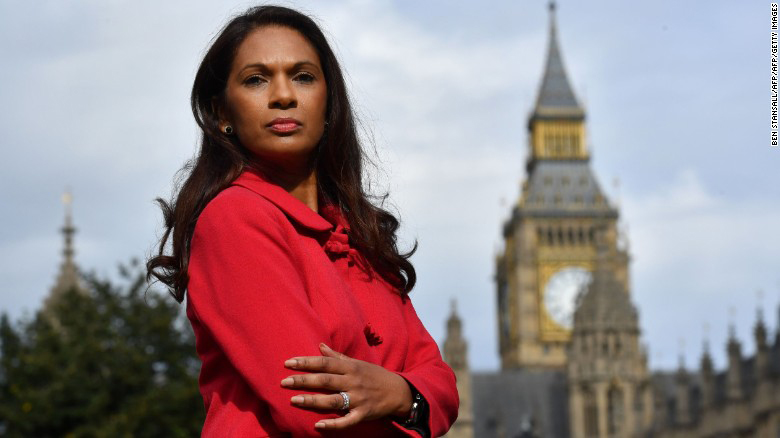Gina Miller, investment manager, philanthropist, social justice advocate and pioneer of the 2016 R. vs Secretary of State for Exiting the European Union case, in conversation with Sherah Beckley, Thomson Reuters Sustainability Editor, elaborates on her journey from growing up in Guyana to achieving success in business. Miller, the daughter of late former Attorney-General Doodnauth Singh, explains how she maintains a balance in her life and gives insight into what drives her commitment to fighting for justice and tools needed to be a strong and independent leader.
Sherah Beckley: Can you give us the highlights in your journey that have moulded you into becoming who you are today?
Gina Miller: The first biggest influence in my life is my father. I am a female image of everything he believed in; — the rule of law, the stabilised society, social justice and the idea of never taking anything for granted. These simple things became the foundation of who I am. A real milestone for me was the birth of my eldest daughter, (who will be 31 soon.) I had made a plan of action: I was going to be successful, and I didn’t want to step off the career ladder. So, I deliberately chose to have her early after university. But she was starved of oxygen on the night of her birth because no one was around to deliver her. Her mental age is about six or seven and because of this, they wanted to institutionalise her, for me to give her up. Its fortunate I listened to my own voice, because I knew what was best for her. “I am best for her. I am her mother. And I could still do all the things I want to do.” I thought, whatever was going to happen, I could cope with, but I couldn’t cope with not having her. That was a major formation of character. That’s when I learned to fight because I wasn’t fighting for myself. I was fighting for her. I fought with the local authorities, the schooling system, with the doctors, and my own family. It ended my first marriage, because her father couldn’t quite accept it. Everyone wanted her looked after, but not by me. That taught me a lot, and I began to realize how strong I was. Mother’s instinct, you know? And the next time would be the court case; the Supreme Court case was extraordinary. I still find it quite difficult to absorb what that means. The two common aspects between raising my daughter and the Supreme Court case are that I just did what I thought was right. It was no big deal to me. I was just doing what was right. But it really dawned on me when a student handed me a paper they had written, during one of my first lectures which had cited the court case. To see it being taught at university was a very special moment.
Looking through a gender equality lens, why empower women in leadership? Why is it crucial to have female leaders?
I think having role models is really important. I call it the womanizing of the world. Women instinctively have qualities that they bring into leadership: collaboration, consciousness, and empathy. We have forgotten to hear the cries of society because of the capitalist economic models that have developed.
Current leaders have forgotten to look after the society in which we live. I think women in leadership roles can bring something different. I’m not saying that women are better than men, but we have an opportunity to be equal with men.
That’s quite different from where we are now, and I think by having role models, women can help other women see how valuable their voice and actions are. When you feel devalued why would you want to push yourself further or take risks? It’s also very important to talk about failure. True resilience is not how you succeed, but how you deal with failure. I have learned lifelong lessons through each of my failures.
How would you say your work connects to sustainable development?
At around age 40 I decided to ask myself, “Who is it that I want to be?” At that age, I wouldn’t be manipulated by anybody. I would be driven by purpose and principles. And with exercises of self-examination, you can be resilient in your own beliefs and focus. Others’ negativity doesn’t matter because you believe in your own path. I decided that my view is a combination of philanthropy and what I call conscious capitalism. Wherever I see something that I think is wrong, I speak out about it. That’s been the case in my work with charities, the investment world, and as a mother. It’s not like I do my philanthropy after six o’clock. I’m not a different person when I’m at work and when I am at home. I live life along my pillow test, which is: can I put my head on my pillow at night and know I did the best I could do that day? My head is light because my conscience is light.
What role do you think men play in driving gender equality?
When it comes to men I think we have to stop the permissive cultures. In many cultures men allow bullying and bigotry against women. Unless they are part of the voices that are speaking up and ending that permissiveness, things aren’t really going to fundamentally change. We need to create an atmosphere and culture where inequality is taboo, whether it’s against women, the disabled, different sexual orientations, etc. because it’s about vulnerability. Equality will happen when we banish vulnerability. That’s why I love campaigns such as HeForShe. I have my son, I have three brothers, I have my husband and they all have to be part of the solution.
What is your advice to future leaders who want to be warriors?
There are probably three things I’d say are key. Don’t worry about other people, think about you. You have to have that confidence that other people do matter, but what they think about you doesn’t matter. You have to be strong in your resolve. What’s happened is that I have become so tough that I have forgotten how soft and funny I am. Being tough is a balancing act. It’s easy to do that trade off, but you mustn’t. I think people overthink things. We are told things are complex and people use language or their intellect to make it as challenging as possible. Keep it simple and go back to basics, because it’s all about what’s right and wrong. Don’t forget your voice because silence is a damaging thing. Even if you speak up and you’re worried about it, there’s a fifty-fifty chance that you are right. You should think about it that way.
What continues to drive and give you hope?
I love the story of Pandora’s Box. At the bottom of the box was empathy. What gives me hope is that if we can rediscover our empathy and if every person can think about what legacy they want to leave, then you’ll have individual pockets of consciousness. That collective consciousness will bring hope. You see it with the women’s march. That was hope. I speak at a lot of schools to young people that story telling is very important. Culturally, it’s something that’s very powerful. I tell them that this consciousness is something that can wash away the ills of the world.
Any final thoughts you’d like to share?
One of the things is Guyana. I miss spending a lot of time playing outside. We didn’t have television. I played, dreamt up games and climbed up trees. We need to exercise the muscles we own; our hearts and our minds. I worry about young people not having that freedom. I try to give it to my children. They have to use their imagination. They write. They talk. And one other thing is that I think women with careers have guilt after having children. If your children feel loved and secure, you don’t have to be there all the time. My children know I love them, if I am there or not. When we are together, we talk. I am honest with them. I know who they are and they know who I am. Because the story I think we forget to tell our children, is the story about ourselves. Who are we really? What were you like at their age? With information from our past, they understand more about themselves because they come from us. This gives them a real sense of love, lets them know how connected they are with you. It’s about the relationship and that really strong bond, not the demand of time.








